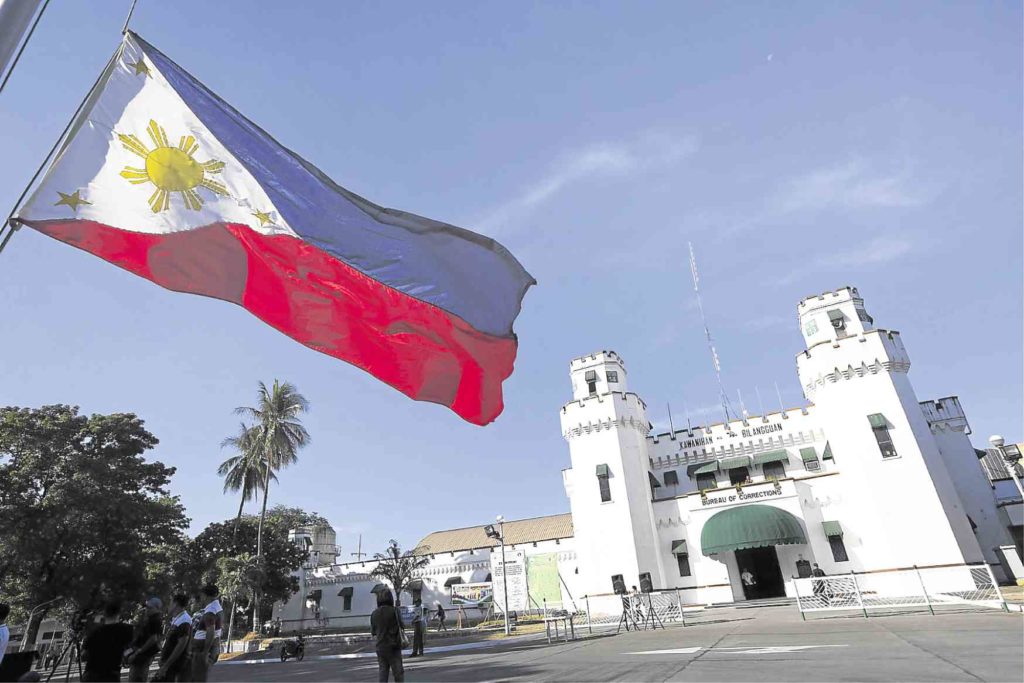
GOOD CONDUCT A law passed in 2013 and implemented a year later has given the opportunity to turn over a new leaf to thousands of prisoners who walked out of state penitentiaries, including New Bilibid Prison (above), after their sentences were reduced for good conduct. —INQUIRER PHOTO
Nearly 2,000 prisoners convicted of heinous crimes have been released after their sentences were cut short since the law that shaves off jail time for good behavior was passed in 2013, a Bureau of Corrections (BuCor) official said on Thursday.
Of 22,049 prisoners who were freed under Republic Act No. 10592, which credits good conduct time allowance (GCTA), 1,914 were convicted of heinous crimes, BuCor legal division chief Fredric Anthony Santos told reporters.
Most of them were supposed to serve long prison sentences for murder (797) and rape (758). The others were convicted of robbery with violence (274), violation of the Dangerous Drugs Act of 2002 (48), parricide (29), kidnapping with illegal detention (5) and destructive arson (3).
According to Santos, an inmate who had been sentenced to 40 years could be released after serving only 21 years, one month and six days in prison under GCTA.
Decongest penitentiary
Officials said the law could help decongest state penitentiaries and allow reformed convicts to turn over a new leaf. BuCor records show that as of July 2019, there were 47,316 inmates in eight state penitentiaries, with the bulk—27,756—held at NBP.
The law drew attention from the public and lawmakers after it was cited last week as the basis for the supposed early release of Antonio Sanchez, a former mayor of Calauan, Laguna, who was serving a total of nine 40-year prison terms.
Sanchez and six of his henchmen were sentenced to seven 40-year imprisonment in 1995 for the brutal 1993 rape and murder of Eileen Sarmenta and the murder of her friend Allan Gomez, both students of the University of the Philippines Los Baños. Sanchez also was sentenced to serve two 40-year terms for the 1991 murder of a father and his son.
Senate probe, DOJ-DILG review
His release, said to have been scheduled for Aug. 20 according to his family, was aborted amid public outrage. President Duterte himself angrily opposed the release of Sanchez.
The outcry prompted Department of Justice (DOJ) officials to declare that he was not eligible for a reduced sentence under Section 1 of the law, which disqualified those charged with heinous crimes, and also because he did not show good behavior for allegedly stashing “shabu” (crystal meth) in his “luxurious kubol (quarters).”
A Senate inquiry into the application of good conduct credits and the implementation of the law is scheduled to open on Monday.
The DOJ and the Department of the Interior and Local Government (DILG) have begun their own review of the guidelines on the grant of good conduct credit for prisoners.
In a joint order issued on Thursday, Guevarra and Interior Secretary Eduardo Año created a nine-member team that was given 10 days to complete the review.
Drafting amendments
The team also was tasked with drafting amendments to the implementing rules and the uniform policy and guidelines on the computation of credits and time allowances under RA 10592.
The team will be cochaired by DOJ and DILG undersecretaries.
Its members include BuCor director general Nicanor Faeldon, a justice assistant secretary, an interior assistant secretary, the director of the Bureau of Jail Management and Penology, the executive director of the Board of Pardons and Parole, the head of the Parole and Probations Administration, and a representative of the DOJ technical group.
SC ruling
In June this year, the Supreme Court ruled that RA 10592 should benefit prisoners already serving time rather than only those convicted after it was signed into law in 2013.
Asked what would happen to the 1,914 inmates who had been freed if the DOJ-DILG team decided to exclude those convicted of heinous crimes, Guevarra replied: “We have to study and discuss that issue very carefully and thoroughly.”
“[It is] not prudent to answer an important question like that without much thought,” he added.
Former Justice Undersecretary Reynante Orceo, however, believed Sanchez and all those convicted of heinous crimes, could “technically” still be granted GCTA.
Orceo headed a joint committee that drafted the December 2017 uniform manual on time allowances and service of sentence.
BUT WHERE’S FAELDON? Lawyer Fredric Anthony Santos (seated, in dark jacket), legal division chief of the Bureau of Corrections (BuCor), gives updates of the status of prisoners who could be covered by the good conduct time allowance process, at a press conference in Muntinlupa City on Thursday. Expected to face the press was BuCor chief Nicanor Faeldon, but he did not show up to answer lingering questions particularly about the aborted release of rape-murder convict and former Calauan, Laguna, Mayor Antonio Sanchez. —GRIG C. MONTEGRANDE
Evading questions
Santos evaded reporters’ questions on the release of several convicts in other heinous crimes that shocked the nation in the 1990s.
On the supposed Aug. 18 memorandum allegedly signed by Faeldon for the release of three men—Albert Caño, Ariel Balansag and Josman Aznar—convicted of the murder of sisters Marijoy and Jacqueline Chiong in 1997, Santos said: “We cannot confirm or deny that document.”
In a TV interview, Faeldon said it was not his signature that was on the document.
Santos said he would only divulge such information if compelled by a court.
He said these newly freed inmates may be “singled out” and hunted down by those who had grudges against them. —WITH A REPORT FROM DONA Z. PAZZIBUGAN